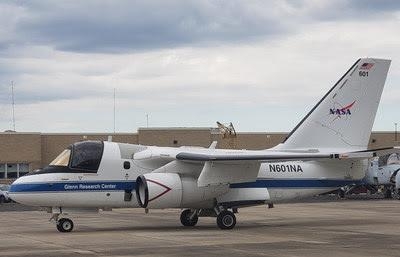Mon, Feb 17, 2020
Final Phase Of A Nine-Year Project To Develop Command And Control Data Link Waveform
Collins Aerospace Systems is entering the final stages of a nine-year project with NASA to enable unmanned aircraft systems (UAS) to operate safely in the National Airspace System (NAS). The project, co-funded by Collins Aerospace and which is expected to be completed in Sept. 2020, has facilitated the development of a Command Non-Payload Control (CNPC) data link waveform that informed the initial certification standards for UAS Command and Control in the NAS.

Collins Aerospace invested in a series of prototype radios to house the waveform for NASA's flight tests. A C-Band prototype CNPC data link radio, called the CNPC-5000, was the baseline for the most recent testing and will continue to be a key component in future research and test flights for other programs.
"CNPC is critical to maintaining positive control of UAS in complex operations within national airspace, such as flights beyond visual line of sight or above 500 feet. We've already applied our CNPC waveform to the FAA's Pathfinder program with BNSF Railway," said Heather Robertson, vice president and general manager, Integrated Solutions for Collins Aerospace. "Our CNPC-5000 data links provide the reliable, safe and secure connection needed to maintain control of unmanned aircraft at all times while operating in the complex environment of controlled airspace."

The prototype CNPC-5000 radio will be supporting NASA's System Integration Operationalization (SIO) program through flights with General Atomics' SkyGuardian. Multiple CNPC-5000 demonstrations are also planned throughout 2020.
Along with the CNPC-5000, Collins Aerospace continues to invest in other critical technologies that will facilitate the integration of UAS into the NAS. This year, the company announced its involvement in the first successful end-to-end flight of General Atomics' SkyGuardian in civil airspace with its Pro Line Fusion integrated avionics system as part of a Certifiable Ground Control Station. The company's web-based WebUAS operations management tool has also been used in various test flights and programs to coordinate the multi-node CNPC network, provide real-time situational awareness to flight safety critical information such as link quality, and act as a gateway to weather, air traffic and critical information and services.
(Images provided with Collins Aerospace news release)
More News
“Honored to accept this mission. Time to take over space. Let’s launch.” Source: SecTrans Sean Duffy commenting after President Donald Trump appointed U.S. Secret>[...]
Permanent Echo Radar signals reflected from fixed objects on the earth's surface; e.g., buildings, towers, terrain. Permanent echoes are distinguished from “ground clutter&rd>[...]
Aero Linx: European Hang Gliding and Paragliding Union (EHPU) The general aim of the EHPU is to promote and protect hang gliding and paragliding in Europe. In order to achieve this>[...]
Glider Encountered A Loss Of Lift And There Was Not Sufficient Altitude To Reach The Airport Analysis: The flight instructor reported that while turning final, the glider encounter>[...]
Airplane Climbed To 100 Ft Above Ground Level, At Which Time The Airplane Experienced A Total Loss Of Engine Power On May 24, 2025, at 1300 eastern daylight time, an Aeronca 7AC, N>[...]
 Aero-News: Quote of the Day (07.11.25)
Aero-News: Quote of the Day (07.11.25) ANN's Daily Aero-Term (07.11.25): Permanent Echo
ANN's Daily Aero-Term (07.11.25): Permanent Echo ANN's Daily Aero-Linx (07.11.25)
ANN's Daily Aero-Linx (07.11.25) NTSB Final Report: Schweizer SGS 2-33A
NTSB Final Report: Schweizer SGS 2-33A NTSB Prelim: Aeronca 7AC
NTSB Prelim: Aeronca 7AC




